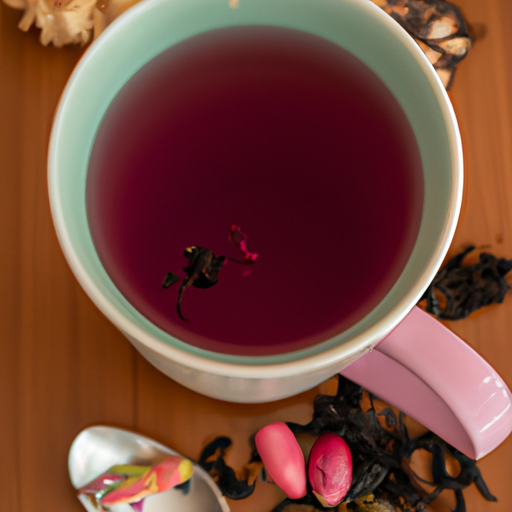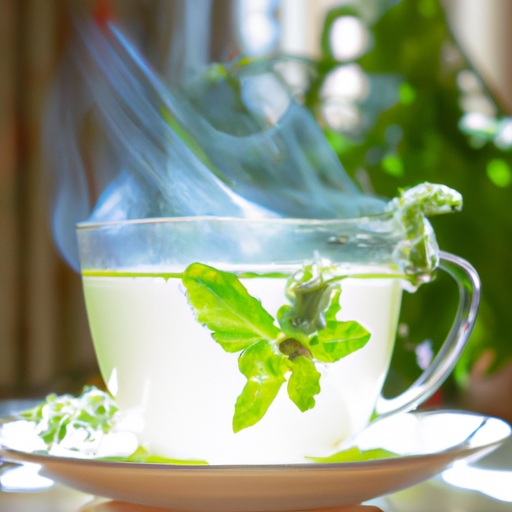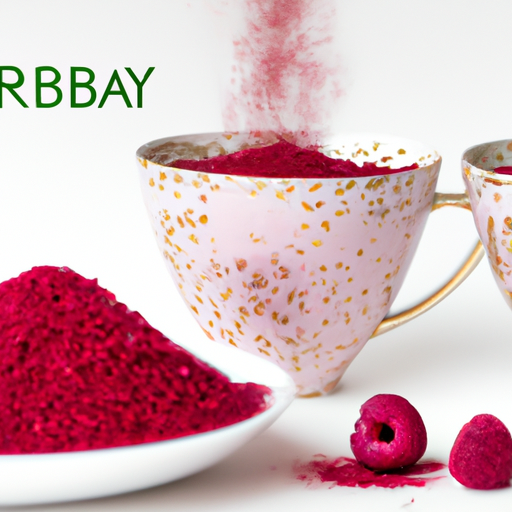When it comes to relieving a dry cough, nature offers a comforting solution: herbal teas. These delicious blends not only taste great but also provide a holistic approach to healing. By utilizing the natural power of plants, we can alleviate our cough and experience the gentle healing properties of nature’s remedies.
Peppermint tea, with its refreshing aroma and cooling properties, can calm an irritated throat and reduce coughing fits.
Chamomile tea, known for its calming effect, can help relax the muscles in the throat and soothe a dry cough.
And let’s not forget about the invigorating qualities of ginger tea, which can provide relief for respiratory ailments and promote healthy lung function.
But the benefits don’t stop there. Licorice root tea, thyme tea, marshmallow root tea, and eucalyptus tea all have their own unique properties that can help alleviate a dry cough. From soothing inflammation to clearing congestion, these herbal teas offer a natural and evidence-based approach to finding relief.
So, why rely on synthetic remedies when nature has provided us with such a bountiful array of healing herbs? Grab your teapot, steep a cup of herbal goodness, and let the rhythm and flow of nature’s remedies guide you towards a cough-free existence.
Key Takeaways
- Peppermint tea is good for dry cough as it calms irritated throat, reduces coughing fits, acts as a natural decongestant, and has anti-inflammatory properties.
- Chamomile tea is beneficial for dry cough as it relaxes throat muscles, soothes dry cough, reduces inflammation in airways, and acts as a mild sedative.
- Ginger tea provides relief for respiratory ailments, promotes healthy lung function, reduces inflammation and irritation in the throat, and has other health benefits.
- Eucalyptus tea is effective for dry cough as it relieves dry coughs, helps clear congestion, contains expectorant properties, and breaks up and expels mucus from the lungs.
Peppermint Tea
If you’re dealing with a pesky dry cough, sipping on a warm cup of peppermint tea is like a comforting hug for your throat. Peppermint tea has numerous benefits that can help soothe and alleviate the symptoms of a dry cough. The menthol present in peppermint leaves acts as a natural decongestant, helping to clear any mucus or phlegm in your airways. This can provide relief and make it easier to breathe.
Additionally, peppermint tea has anti-inflammatory properties that can reduce irritation in the throat, further calming the cough reflex.
To make peppermint tea, simply steep a handful of fresh or dried peppermint leaves in hot water for about 5-10 minutes. You can add a teaspoon of honey for added sweetness and additional throat-soothing benefits. Sip on this warm and aromatic tea throughout the day to experience its soothing effects.
Transitioning into the topic of chamomile tea, another herbal remedy for dry coughs, we find that it offers a different set of benefits.
Chamomile Tea
When you’re feeling like a desert, reach for a cup of chamomile’s soothing oasis. Chamomile tea has been used for centuries as a natural remedy for various ailments, including respiratory issues. The benefits of chamomile tea for respiratory health are abundant. Its anti-inflammatory properties help to reduce inflammation in the airways, providing relief for dry coughs and other respiratory symptoms.
Chamomile tea also acts as a mild sedative, helping to calm the body and promote restful sleep, which is crucial for healing and recovering from a cough.
Making chamomile tea at home is a simple and enjoyable process. Start by boiling water and adding dried chamomile flowers to a teapot or infuser. Let it steep for about 5 minutes to allow the water to extract the beneficial compounds from the flowers. Then, strain the tea into a cup and enjoy its warm and comforting flavor. You can add a teaspoon of honey for added sweetness and additional soothing effects.
Transitioning into the subsequent section about ginger tea, another herbal remedy for coughs, it’s important to note that chamomile tea and ginger tea can complement each other in alleviating respiratory symptoms. While chamomile tea provides soothing relief, ginger tea is known for its expectorant properties, helping to loosen mucus and ease congestion. Together, these teas can provide a holistic approach to treating a dry cough and promoting respiratory health.
Ginger Tea
To alleviate respiratory symptoms and promote healing, you’ll find comfort in sipping on a warm cup of ginger tea. Ginger has long been revered for its medicinal properties, and its benefits extend to soothing a dry cough. This natural remedy helps to reduce inflammation and irritation in the throat, providing relief from the persistent urge to cough.
Making ginger tea at home is simple and requires just a few ingredients. Start by peeling and slicing a fresh ginger root into thin pieces. Place the ginger slices in a pot of boiling water and let it simmer for about 10 minutes. Strain the tea into a cup and add a squeeze of lemon juice or a drizzle of honey for added flavor and health benefits.
Not only does ginger tea help with coughing, but it also provides other health benefits. It aids digestion, boosts the immune system, and has anti-inflammatory properties. Additionally, ginger contains antioxidants that can help fight off infections and reduce the severity of cold symptoms.
Transitioning to the next section, licorice root tea, you’ll discover another herbal remedy that can provide relief for a dry cough.
Licorice Root Tea
You’ll be pleasantly surprised by how licorice root can provide relief for your persistent throat irritation, allowing you to finally find some comfort.
Licorice root tea, made from the root of the licorice plant, has been used for centuries to ease coughs and soothe sore throats. This natural remedy contains compounds that have anti-inflammatory and expectorant properties, making it effective in reducing dry cough symptoms.
Licorice root tea benefits extend beyond its soothing effects. It can help to thin and loosen mucus, making it easier to expel from the respiratory tract. This can provide relief from congestion and make breathing more comfortable. Licorice root also contains compounds that have antiviral and antibacterial properties, which may help to fight off the underlying infection causing the cough.
While licorice root tea can offer relief, it’s important to note that excessive consumption may lead to side effects. Some people may experience high blood pressure or low potassium levels with prolonged use. It’s always best to consult with a healthcare professional before incorporating licorice root tea into your routine.
Now that we’ve explored the benefits and potential side effects of licorice root tea, let’s move on to the next herbal remedy: thyme tea.
Thyme Tea
If you’re looking for a flavorful and invigorating option to soothe your throat, thyme tea is a fantastic choice. Thyme, a herb with a delightful aroma and a long history of medicinal use, offers numerous benefits for relieving a dry cough. Making thyme tea at home is simple and only requires a few ingredients.
Here are the key benefits and a step-by-step guide to brewing this herbal remedy:
- Thyme tea benefits:
- Soothes throat irritation: Thyme contains compounds that help calm inflammation and reduce discomfort in the throat, providing relief from a dry cough.
- Expels mucus: The expectorant properties of thyme tea help loosen and expel mucus, clearing the airways and promoting easier breathing.
To make thyme tea at home:
-
Boil 1 cup of water.
-
Add 1-2 teaspoons of dried thyme leaves to a teapot or cup.
-
Pour the boiling water over the thyme leaves.
-
Steep for 5-10 minutes.
-
Strain the tea and enjoy.
Thyme tea not only tastes delicious but also offers natural relief for a dry cough. Transitioning to the subsequent section about "marshmallow root tea," another herbal remedy for throat irritation and cough, we delve deeper into the world of soothing herbal teas.
Marshmallow Root Tea
Experience the soothing power of marshmallow root with a warm cup of this comforting remedy. Marshmallow root tea is not only delicious but also offers many health benefits. It has been used for centuries to relieve dry coughs, thanks to its natural demulcent properties. When brewed, marshmallow root forms a gel-like substance that coats the throat, providing relief from irritation and inflammation.
To prepare marshmallow root tea for maximum effectiveness, start by adding 1 tablespoon of dried marshmallow root to a cup of boiling water. Let it steep for about 10 minutes, allowing the beneficial compounds to infuse into the water. Strain the tea and enjoy it while it’s still warm. You can add a touch of honey or lemon for added flavor.
Now, let’s take a moment to appreciate the healing power of marshmallow root tea. Imagine sitting down with a steaming cup of this soothing drink, feeling the warmth spread through your body. As you take a sip, you can almost feel the gel-like substance gently coating your throat, providing relief from that persistent dry cough. It’s a moment of calm and comfort, knowing that nature has provided us with such a gentle and effective remedy.
As we explore other herbal teas for cough relief, let’s dive into the benefits of eucalyptus tea.
Eucalyptus Tea
Picture yourself in a cozy corner, sipping on a steamy cup of eucalyptus tea, feeling the invigorating aroma fill your senses. Eucalyptus tea isn’t just a delicious beverage but also a wonderful herbal remedy for respiratory health. It’s been used for centuries to soothe coughs, clear congestion, and promote overall respiratory wellness.
One of the key benefits of eucalyptus tea is its ability to relieve dry coughs. The active compounds in eucalyptus, like cineole, have expectorant properties that help break up and expel mucus from the lungs. This can provide relief from the irritation and discomfort caused by a dry cough.
Making eucalyptus tea at home is simple and easy. Start by boiling water and adding a few fresh or dried eucalyptus leaves. Let the leaves steep for about 10 minutes to allow the beneficial compounds to infuse into the water. You can also add a touch of honey or lemon to enhance the flavor and add additional soothing properties.
Sipping on a cup of eucalyptus tea can be a comforting and natural way to alleviate a dry cough and support respiratory health. So next time you’re in need of some respiratory relief, brew yourself a cup of this delightful herbal tea and enjoy its many benefits.
Frequently Asked Questions
Can herbal teas completely cure a dry cough?
Herbal teas can be beneficial for a dry cough as they have natural remedies that can soothe the throat and reduce irritation. While they may not completely cure a cough, they can provide relief and support the body’s healing process.
Are there any side effects of drinking herbal teas for a dry cough?
While herbal teas for a dry cough may seem like a magical elixir, it’s important to acknowledge the potential risks. Some herbs can interact with medications, so consultation with a healthcare professional is advised.
How often should I drink herbal teas for a dry cough?
I drink herbal teas for a dry cough as often as needed. To prepare, steep different types of herbal teas like chamomile, ginger, or licorice root in hot water. These natural remedies can soothe and relieve cough symptoms.
Can children and pregnant women consume herbal teas for a dry cough?
Children and pregnant women should exercise caution when consuming herbal teas for a dry cough. It is crucial to consult with a healthcare professional to ensure safety. Remember, "An ounce of prevention is worth a pound of cure."
Are there any specific precautions to consider when using herbal teas for a dry cough?
When using herbal teas for a dry cough, it is important to take certain precautions. It is advisable to consult with a healthcare professional to ensure safety and effectiveness.
Conclusion
In conclusion, when it comes to finding relief for a dry cough, herbal teas can be a soothing and natural option. Peppermint tea, with its refreshing taste and cooling properties, can calm the throat and ease irritation. Chamomile tea, known for its calming and anti-inflammatory effects, can help reduce coughing. Ginger tea, with its warming and expectorant properties, can provide relief by loosening mucus. Licorice root tea, thyme tea, marshmallow root tea, and eucalyptus tea all have their own unique benefits in alleviating a dry cough.
Embrace the power of nature and sip on these herbal teas to find comfort and healing.










